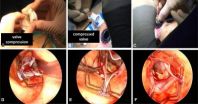(Press-News.org) Two UT Arlington management professors argue that employers can prevent workplace violence by keeping dangerous employees positively engaged and closely supervising them to ensure they get the help they need.
James Campbell Quick and M. Ann McFadyen of the College of Business management department analyzed FBI reports, case studies and human resource records to focus on the estimated 1 to 3 percent of employees prone to workplace acts of aggression, such as homicide, suicide or destruction of property.
The team advances the case for "mindfully observing" employees and found that human resources professionals and supervisors can advance health, wellbeing, and performance while averting danger and violence by identifying and managing high-risk employees, anticipating their needs and providing support and resources.
"The cause of these problems are understandable and predictable," said Quick, a Distinguished Professor of Leadership and Organizational Behavior. "And many times these violent incidents shouldn't be viewed as random or surprises."
The paper, "No Accident: Health, Wellbeing, Performance … and Danger," is published by the Journal of Organizational Effectiveness: People and Performance. The two teamed with Oklahoma State University's Debra Nelson on the study. Nelson is the Spears School of Business Associates' Chaired Professor of Business Administration and Distinguished Professor of Management. She also was the 2004 Goolsby Distinguished Visiting Professor.
"Corporations need to plug troubled employees into the social network immediately so they don't store up these negative feelings whenever and wherever they get them," said Quick, who also holds the John and Judy Goolsby-Jacqualyn A. Fouse Endowed Chair in the Goolsby Leadership Academy. Quick also is a distinguished visiting scholar at Lancaster University Management School in the United Kingdom.
College of Business Dean Rachel Croson said this type of research adds insight for businesses in the real world.
"Businesses often look at these problems only after they occur," Croson said. "This research offers companies action steps they can take to prevent such tragedies from occurring. It not only helps people but could save lives."
McFadyen's role in the research was looking at positive and negative deviant behaviors among employees. Positive deviant acts will often benefit the organization (i.e. going out of one's way to help another). Conversely, negative deviant acts will likely have an adverse impact on the organization and have the potential to put the organization or others in danger.
The study noted that the low intense negative deviant act of incivility is often the starting point of the escalation to more dangerous and violent behavior.
"Incivility toward another includes gossiping, texting in meetings, withholding information, ignoring or simply a general lack of respect or regard for others," McFadyen said. "What is concerning is that incivility is on the rise in the workplace, with the majority of employees reporting that they have been the target of incivility by another."
Research indicates that most organizations have training on ethics and diversity, yet few provide training on incivility.
McFadyen said the study gives guidance on how to train supervisors to recognize and monitor incivility.
"Incivility, left unchecked, may lead to more dangerous acts", McFadyen said, "Research indicates that, while not all acts of incivility lead to violent acts, all violent acts in the workplace were preceded by acts of incivility."
One challenge, Quick said, is that employees often cannot be pre-screened for these tendencies. He said dangerous employees don't often show the inclination for dangerous behavior during the interview process.
"It's often something that those employees get once they're in a job," Quick said. "That's why socialization and making sure employees air out what's bothering them are two big factors in whether the behavior eventually becomes an incident."
Quick said it's imperative for organizations to keep the employees talking about what it is that's bothering them.
"You can't allow the dangerous employee to bury the issue," Quick said. "And sometimes organizations have a problem in wanting to see the issue come to the surface. Organizations have to admit they be part of the problem."
Quick and the team take actual cases where dangerous employees took action that ended in a wrongful death, sexual assault and management harassment. The team also looked at one positive organizational case where harm and death were averted.
In addition, the study also shows what organizations and people need to do to right themselves after dangerous employees' behavior leads to a violent incident.
Quick said the study outlines a four-step approach if the worse should happen:
Contain the perpetrator or problem.
Provide physical and mental caregiving for victims of the incident.
Encourage forgiveness of the dangerous employee. Forgiveness is not condoning, excusing, denying, minimizing or forgetting a wrong.
Learning from the dangerous employee's incident.
INFORMATION:
The University of Texas at Arlington is a comprehensive research institution and the second largest institution in The University of Texas System. The Chronicle of Higher Education ranked UT Arlington as the seventh fastest-growing public research university in 2013. U.S. News & World Report ranks UT Arlington fifth in the nation for undergraduate diversity. Visit http://www.uta.edu to learn more. Follow #UTAdna on Twitter.
Giving dangerous employees socialization, close supervision can avoid problems
Paper gives tips on what to do if violent incidents occur
2014-03-11
ELSE PRESS RELEASES FROM THIS DATE:
Long-term warming likely to be significant despite recent slowdown
2014-03-11
A new NASA study shows Earth's climate likely will continue to warm during this century on track with previous estimates, despite the recent slowdown in the rate of global warming.
This research hinges on a new and more detailed calculation of the sensitivity of Earth's climate to the factors that cause it to change, such as greenhouse gas emissions. Drew Shindell, a climatologist at NASA's Goddard Institute for Space Studies in New York, found Earth is likely to experience roughly 20 percent more warming than estimates that were largely based on surface temperature observations ...
Acoustic cloaking device hides objects from sound
2014-03-11
VIDEO:
This video demonstrates the difference in how sound waves act with and without the acoustic cloak in their path. The red and blue lines represent the high and low points...
Click here for more information.
DURHAM, N.C. -- Using little more than a few perforated sheets of plastic and a staggering amount of number crunching, Duke engineers have demonstrated the world's first three-dimensional acoustic cloak. The new device reroutes sound waves to create the impression that ...
Scientists 'herd' cells in new approach to tissue engineering
2014-03-11
VIDEO:
Videos show the effect of electric fields on the movement of epithelial cells. The first clip shows the cells migrating normally until the electric field is turned on, causing the...
Click here for more information.
Berkeley -- Sometimes it only takes a quick jolt of electricity to get a swarm of cells moving in the right direction.
Researchers at the University of California, Berkeley, found that an electrical current can be used to orchestrate the flow of a group ...
Prosocial youth less likely to associate with deviant peers, engage in problem behaviors
2014-03-11
COLUMBIA, Mo. – Prosocial behaviors, or actions intended to help others, remain an important area of focus for researchers interested in factors that reduce violence and other behavioral problems in youth. However, little is known regarding the connection between prosocial and antisocial behaviors. A new study by a University of Missouri human development expert found that prosocial behaviors can prevent youth from associating with deviant peers, thereby making the youth less likely to exhibit antisocial or problem behaviors, such as aggression and delinquency.
"This ...
Finding hiding place of virus could lead to new treatments
2014-03-11
WINSTON-SALEM, N.C. – March 11, 2014 – Discovering where a common virus hides in the body has been a long-term quest for scientists. Up to 80 percent of adults harbor the human cytomegalovirus (HCMV), which can cause severe illness and death in people with weakened immune systems.
Now, researchers at Wake Forest Baptist Medical Center's Institute for Regenerative Medicine report that stem cells that encircle blood vessels can be a hiding place, suggesting a potential treatment target.
In the American Journal of Transplantation (online ahead of print), senior scientist ...
First human totally endoscopic aortic valve replacements reported
2014-03-11
Beverly, MA, March 11, 2014 – Surgeons in France have successfully replaced the aortic valve in two patients without opening the chest during surgery. The procedure, using totally endoscopic aortic valve replacement (TEAVR), shows potential for improving quality of life of heart patients by offering significantly reduced chest trauma. It is described in the Journal of Thoracic and Cardiovascular Surgery, an official publication of the American Association for Thoracic Surgery.
Endoscopic surgery is already used by cardiovascular surgeons for procedures such as atrial ...
No one likes a copycat, no matter where you live
2014-03-11
VIDEO:
One puppet peeks at another puppet's drawing because he can't decide what to draw, but he then draws a unique picture.
Click here for more information.
Even very young children understand what it means to steal a physical object, yet it appears to take them another couple of years to understand what it means to steal an idea.
University of Washington psychologist Kristina Olson and colleagues from Yale and the University of Pennsylvania discovered that preschoolers ...
Global survey of urban birds and plants find more diversity than expected
2014-03-11
AMHERST, Mass. – The largest analysis to date of the effect of urbanization on bird and plant species diversity worldwide confirms that while human influences such as land cover are more important drivers of species diversity in cities than geography or climate, many cities retain high numbers of native species and are far from barren environments.
Urban ecologist Paige Warren of the University of Massachusetts Amherst, co-leader of a 24-member research working group at the University of California Santa Barbara's National Center for Ecological Analysis and Synthesis ...
Diets high in animal protein may help prevent functional decline in elderly individuals
2014-03-11
A diet high in protein, particularly animal protein, may help elderly individuals function at higher levels physically, psychologically, and socially, according to a study published in the Journal of the American Geriatrics Society.
Due to increasing life expectancies in many countries, increasing numbers of elderly people are living with functional decline, such as declines in cognitive ability and activities of daily living. Functional decline can have profound effects on health and the economy.
Research suggests that aging may reduce the body's ability to absorb or ...
Substance naturally found in humans is effective in fighting brain damage from stroke
2014-03-11
DETROIT – A molecular substance that occurs naturally in humans and rats was found to "substantially reduce" brain damage after an acute stroke and contribute to a better recovery, according to a newly released animal study by researchers at Henry Ford Hospital.
The study, published online before print in Stroke, the journal of the American Heart Association, was the first ever to show that the peptide AcSDKP provides neurological protection when administered one to four hours after the onset of an ischemic stroke.
This type of a stroke occurs when an artery to the brain ...
LAST 30 PRESS RELEASES:
Scientists discover why we know when to stop scratching an itch
A hidden reason inner ear cells die – and what it means for preventing hearing loss
Researchers discover how tuberculosis bacteria use a “stealth” mechanism to evade the immune system
New microscopy technique lets scientists see cells in unprecedented detail and color
Sometimes less is more: Scientists rethink how to pack medicine into tiny delivery capsules
Scientists build low-cost microscope to study living cells in zero gravity
The Biophysical Journal names Denis V. Titov the 2025 Paper of the Year-Early Career Investigator awardee
Scientists show how your body senses cold—and why menthol feels cool
Scientists deliver new molecule for getting DNA into cells
Study reveals insights about brain regions linked to OCD, informing potential treatments
Does ocean saltiness influence El Niño?
2026 Young Investigators: ONR celebrates new talent tackling warfighter challenges
Genetics help explain who gets the ‘telltale tingle’ from music, art and literature
Many Americans misunderstand medical aid in dying laws
Researchers publish landmark infectious disease study in ‘Science’
New NSF award supports innovative role-playing game approach to strengthening research security in academia
Kumar named to ACMA Emerging Leaders Program for 2026
AI language models could transform aquatic environmental risk assessment
New isotope tools reveal hidden pathways reshaping the global nitrogen cycle
Study reveals how antibiotic structure controls removal from water using biochar
Why chronic pain lasts longer in women: Immune cells offer clues
Toxic exposure creates epigenetic disease risk over 20 generations
More time spent on social media linked to steroid use intentions among boys and men
New study suggests a “kick it while it’s down” approach to cancer treatment could improve cure rates
Milken Institute, Ann Theodore Foundation launch new grant to support clinical trial for potential sarcoidosis treatment
New strategies boost effectiveness of CAR-NK therapy against cancer
Study: Adolescent cannabis use linked to doubling risk of psychotic and bipolar disorders
Invisible harms: drug-related deaths spike after hurricanes and tropical storms
Adolescent cannabis use and risk of psychotic, bipolar, depressive, and anxiety disorders
Anxiety, depression, and care barriers in adults with intellectual and developmental disabilities
[Press-News.org] Giving dangerous employees socialization, close supervision can avoid problemsPaper gives tips on what to do if violent incidents occur






